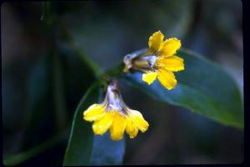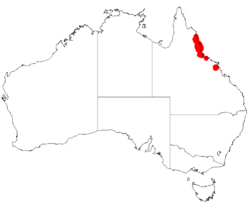Biology:Scaevola enantophylla
| Climbing fan-flower | |
|---|---|

| |
| Scientific classification | |
| Kingdom: | Plantae |
| Clade: | Tracheophytes |
| Clade: | Angiosperms |
| Clade: | Eudicots |
| Clade: | Asterids |
| Order: | Asterales |
| Family: | Goodeniaceae |
| Genus: | Scaevola |
| Species: | S. enantophylla
|
| Binomial name | |
| Scaevola enantophylla F.Muell.[1]
| |

| |
| Occurrence data from Australasian Virtual Herbarium | |
| Synonyms[2] | |
|
Lobelia enantophylla (F.Muell.) Kuntze | |
Scaevola enantophylla, commonly known as climbing fan-flower,[3]is a species of flowering plant in the family Goodeniaceae and is endemic to Queensland. It is a scrambling vine with yellow fan-shaped flowers, and the only species in the genus with leaves arranged opposite.
Description
Scaevola enantophylla is a scrambling vine up to 4 m (13 ft) long, it may be smooth or with soft, short hairs. The leaves are egg-shaped to lance-shaped, finely toothed, arranged opposite, 4–15 cm (1.6–5.9 in) long, 20–60 mm (0.79–2.36 in) wide, tapering to a point on a short petiole. The fan-shaped flowers are borne in cymes in leaf axils on a peduncle up to 16 mm (0.63 in) long, bracteoles triangular shaped, usually up to 1 mm (0.039 in) long, and each flower on a pedicel up to 5 mm (0.20 in) long. The yellow corolla 14–20 mm (0.55–0.79 in) long, smooth on the outside, thickly bearded on the inside, and the wings up to 1.5 mm (0.059 in) wide. Flowering occurs from July to November and the fruit narrowly egg-shaped, black, 10–12 mm (0.39–0.47 in) long, smooth or with occasional hairs.[3][4]
Taxonomy
Scaevola enantophylla was first formally described in 1873 by Ferdinand von Mueller and the description was published in Fragmenta Phytographiae Australiae.[5][6]
Distribution and habitat
Climbing fan-flower grows near forests on the east coast of Queensland.[7]
References
- ↑ "Scaevola enantophylla". Australian Plant Census. https://biodiversity.org.au/nsl/services/apc-format/display/109558.
- ↑ "Scaevola enantophylla F.Muell. | Plants of the World Online | Kew Science". http://powo.science.kew.org/taxon/urn:lsid:ipni.org:names:384194-1.
- ↑ 3.0 3.1 "Scaevola enantophylla". Centre for Australian National Biodiversity Research (CANBR), Australian Government. 2020. https://apps.lucidcentral.org/rainforest/text/entities/Scaevola_enantophylla.htm.
- ↑ Carolin, R.C. "Scaevola enantophylla". Australian Biological Resources Study, Department of Agriculture, Water and the Environment. https://profiles.ala.org.au/opus/foa/profile/Scaevola%20enantophylla.
- ↑ "Scaevola enantophylla". Australian Plant Name Index. https://biodiversity.org.au/nsl/services/rest/instance/apni/541021.
- ↑ von Mueller, Ferdinand (1873). Fragmenta Phytographiae Australiae (8(61) ed.). Melbourne. p. 58.
- ↑ Carolin, R.C; George, A.S (1992). Flora of Australia Volume 35. Canberra: Australian Government Publishing Service. p. 101. https://www.awe.gov.au/sites/default/files/env/pages/b0354ba6-bb62-4604-9fc1-78a64a005f95/files/flora-australia-35-brunoniaceae-goodeniaceae.pdf. Retrieved 24 March 2022.
External links
- Scaevola enantophylla (Flickr)
- Scaevola enantophylla Images (North Queensland Plants)
- Scaevola enantophylla: Isotype (U0253443) collected J.Dallachy at Rockingham Bay
Wikidata ☰ Q63872471 entry
 |

